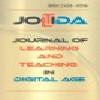Examination of Digital Game Addiction Levels of Adolescent Mainstreaming Students
kaynaştırma öğrencisi, ergenler, dijital oyun, dijital oyun bağımlılığı, yetersizliği olan öğrenciler
Examination of Digital Game Addiction Levels of Adolescent Mainstreaming Students
mainstreaming students, adolescents, digital game, digital game addiction, students with disabilities,
___
- Afacan, O., & Ozbek, N. (2019). Investigation of social media addiction of high school students. International Journal of Educational Methodology, 5(2), 235-245. https://doi.org/10.12973/ijem.5.2.235.
- Al-Dababneh, K. A. & Al-Zboon, E. K. (2018). Understanding impulsivity among children with specific learning disabilities in inclusion schools. Learning Disability Quarterly, 41(2), 100-112.
- Bailey, K.D. (1973). Monothetic and polythetic typologies and theır relation to conceptualization, measurement, and scaling. American Sociological Review, 38 (1), 18-33.
- Bayrak, N. (2020). Üniversite öğrencilerinde akıllı telefon bağımlılığı ve olası erişkin dikkat eksikliği hiperaktivite bozukluğu arasındaki ilişki (Master's Thesis). İstanbul: İstanbul Gelişim University.
- Bekar, B. (2018). Dikkat eksikliği hiperaktivite bozukluğu olan ve olmayan çocuklarda bilgisayar oyun bağımlılığı (Master's Thesis). Gaziantep: Hasan Kalyoncu University.
- Bhagat, S., Jeong, E.J.& Kim, D.H. (2020). The Role of individuals need for online social interactions and interpersonal incompetence in digital game addiction, International Journal of Human–Computer Interaction, 36 (5), 449-463, https://doi.org/10.1080/10447318.2019.1654696.
- Brown, G.T.L. & Hattie, C. (2012). The Benefits of Regular Standardized Assesment In Childhood Education. Sebastian Suggate, ve Elaine Reese (Ed.). Comtemporary Debates in Childhood Education and Development içinde (ss.287-293). Routledge. ISBN: 978-0-415-61489-4.
- Can, A. (2017). Bilimsel araştırma sürecinde nicel veri analizi. Pegem.
- Chiu, S., Lee, J.Z. & Huang, D.H. (2004). Video game addiction in children and teenagers in Taiwan. Cyberpsychology and Behavior, 571-581, https://doi.org/10.1089/cpb.2004.7.571.
- Cohen, J. (1988). Statistical power analysis for the behavioral sciences (2nd Edition). Erlbaum.
- Coutelle, R., Weiner, L., Paasche, C., Pottelette, J., Bertschy, G., Scröder, C.M. & Lalanne, L. (2021). Autism Spectrum Disorder and Video Games: Restricted Interests or Addiction?. International Journal of Mental Health Addiction, https://doi.org/10.1007/s11469-021-00511-4.
- Ellis, P. D. (2010), The Essential Guide to Effect Size, Statistical Power, MetaAnalysis and Interpretation Research Results. Cambridge University Press
- Field, A. P. (2009). Discovering statistics using SPSS: (and sex and drugs and rock 'n' roll). SAGE.
- Griffiths, M.D., (2010). Excessive online computer use and learning disabilities. Australian Journal of Dyslexia and Other Learning Disabilities, 5, 31-34. Erişim Tarihi: 04.05.2021, http://irep.ntu.ac.uk/id/eprint/10719.
- Griffiths, M.D. (2014). An Overview of Online Gaming Addiction. Thorsten Quandt ve Sonja kröger (Ed.) Multiplayer: The Social Aspects of Gaming içinde. Routledge.
- Gros, B. (2017). Digital games in education. Journal of Research on Technology Education, 40(1), 23-38, https://doi.org/10.1080/15391523.2007.10782494.
- Horzum, M.B. (2011). İlköğretim öğrencilerinin bilgisayar oyunu bağımlılık düzeylerinin çeşitli değişkenlere göre incelenmesi. Eğitim ve Bilim, 36(159), 56-68.
- Huizinga, J. (2006). Homo Ludens: Oyunun Toplumsal İşlevi Üzerine Bir Deneme, Çev: Mehmet Ali Kılıçbay, İstanbul: Ayrıntı Yayınları, 2. Baskı
- Jeong, E.J., Kim, D.J., Lee, D.M. & Lee, H.R. (2016). A study of digital game addiction from aggression, loneliness and depression perspectives. 49. Hawaii International Conference on System Sciences (HICSS), ss. 3769-3780, https://doi.org/10.1109/HICSS.2016.470.
- Karagöz, Y. (2017). SPSS ve AMOS Uygulamalı Nitel Nicel Karma Bilimsel Araştırma Yöntemleri ve Yayın Etiği. Nobel.
- Karasar, N. (2000). Bilimsel Araştırma Yöntemi. Nobel.
- Kim, E., Namkoong, K., Ku, T., ve Kim, S. (2008). The relationship between online game addiction and aggression, self-control, and narcissistic personality traits. European Psychiatry, 23(3), 212-218. https://doi.org/10.1016/j.eurpsy.2007.10.010.
- Kislyakov, P.A. (2017). Risk factors related to antisocial behavior in teenagers with intellectual disabilities, Psychology in Russia: State of the Art,10(2), 215-227.
- Kneer, J., Rieger, D., Ivory, J.D. & Ferguson, C. (2014). Awareness of risk factors for digital game addiction: ınterviewing players and counselors. Int J Ment Health Addiction 12, 585–599. https://doi.org/10.1007/s11469-014-9489-y.
- Lemmens, J.S., Valkenburg, P., M. & Peter, J. (2009) Development and Validation of a Game Addiction Scale for Adolescents, Media Psychology, 12:1, 77-95, https://doi.org/10.1080/15213260802669458.
- Özdarendeli, E. (2021). Özel öğrenme güçlüğüne sahip çocukların internet bağımlılığı, denetim odağı ile aile içi ilişkilerinin incelenmesi (Master's Thesis). Konya: KTO Karatay University.
- Özçomak, M.S. & Çebi, K. (2017). İstatistiksel güç analizi: Atatürk üniversitesi iktisadi ve idari bilimler dergisi üzerine bir uygulama. Atatürk Üniversitesi İktisadi ve İdari Bilimler Dergisi, 31(2), 413-431.
- Rooij, A.J., Schoenmakers, T.M. Vermulst, A.A., Eijnden, R.J.J.M. & Mheen, D. (2011). Online video game addiction: identification of addicted adolescent gamers. Addiction, 106(1), 205-212. https://doi.org/10.1111/j.1360-0443.2010.03104.x.
- Sedlak, R. A., Doyle, M. & Schloss, P. (1982). Video games: a training and generalization demonstration with severely retarded adolescents. Division on Autism and Developmental Disabilities, 17 (4), 332-336, http://www.jstor.org/stable/23877304.
- Tufan, A.E. & Yaluğ, İ. (2010). Erişkinlerde dikkat eksikliği hiperaktivite bozukluğu: Türkiye verilerine dayalı bir gözden geçirme. Anadolu Psikiyatri Dergisi, 11, 351-359.
- Tuğlu, C ve Şahin, Ö.Ö. (2010) Erişkin dikkat eksikliği hiperaktivite bozukluğu: nörobiyoloji, tanı sorunları ve klinik özellikler. Psikiyatride Güncel Yaklaşımlar-Current Approaches in Psychiatry, 2 (1), 75-116.
- Üdücü, E. (2019). Özel öğrenme güçlüğü tanısı almış ve almamış 10-16 yaş arası öğrencilerin internet bağımlılığı düzeylerinin karşılaştırılması (Master's Thesis). İstanbul: İstanbul Gelişim University.
- Weinstein, A.M. (2010) Computer and video game addiction—a comparison between game users and non-game users, The American Journal of Drug and Alcohol Abuse, 36(5), 268-276, https://doi.org/10.3109/00952990.2010.491879.
- Yalçın Irmak, A. & Erdoğan, S. (2015). Dijital Oyun Bağımlılığı Ölçeği Türkçe formunun geçerliliği ve güvenilirliği. Anadolu Psikiyatri Dergisi, 16(Özel Sayı.1), 10-18.
- Yalçın Irmak, A. & Erdoğan, S. (2016). Ergen ve genç erişkinlerde dijital oyun bağımlılığı: güncel bir bakış. Anadolu Psikiyatri Dergisi, 27(2), 128-137.
- Zhu, J. Zhang, W., Yu, C. & Bao, Z. (2015). Early adolescent internet game addiction in context: How parents, school, and peers impact youth. Computers In Human Behavior, 50, 159-168. https://doi.org/10.1016/j.chb.2015.03.079.
- Yayın Aralığı: 2
- Başlangıç: 2016
- Yayıncı: Mehmet Akif Ocak
Begüm SERTYEŞİLIŞIK, Egemen SERTYEŞİLIŞIK
Students’ Opinions on the Usage of Mobile Augmented Reality Application in Health Education
Examining The Prediction of Digital Game Addiction Awareness on Digital Educational Game Usage
Burcu KARABULUT COŞKUN, Arif AKÇAY
Canan ÖZÇELİK AKAY, Ozlem CAKİR
Filiz METE, Berra ALİBAŞİÇ, Beyza KÖKSAL
Development and Validation of the Teachers’ Digital Competence Scale (TDiCoS)
